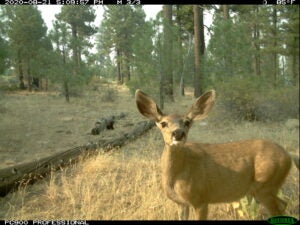
Ranch Fire Deer Project
Investigators: Carly White, Ben Sacks, Joshua Bush (CDFW)
Large-scale wildfire events are becoming more common in the face of persistent drought and climate change, particularly in California. It is important to understand how forest communities are impacted by large-scale fires, as it can have a significant impact on wildlife populations and how we manage and protect them. Until 2020, the Ranch fire (part of the Mendocino complex fire of 2018) was the largest fire in California history, burning 166,003 ha of primarily Mendocino National Forest land. The objective of this study is to determine the impact of the 2018 Ranch Fire in the Mendocino National Forest and adjacent lands on deer population density, diet composition, and habitat utilization to inform management decisions after large wildfires.
A comprehensive fecal DNA (fDNA) mark recapture population estimate was conducted by the California Department of Fish and Wildlife (CDFW) in 2017 and 2018, immediately prior to the Ranch Fire. A subset of 26 plots from the original study were chosen for resurvey after the fire in the summers of 2019 and 2020, and surveys will continue in 2021. Each plot contains a 1.2-km transect that is visited four times, approximately seven days apart, to collect deer fecal pellets for analysis. Two to three trail cameras are deployed and general habitat data, including major species present and percent cover, are collected at each site. Additionally, GPS telemetry data from collared adult does will be provided by CDFW. Deer abundance and density before and after the fire will be estimated using a culmination of this data and fDNA mark-recapture modeling. Additionally, we will analyze fecal samples using DNA metabarcoding to asses changes in diet composition post-fire. The findings of this project will be important for re-evaluating what is currently known about deer and wildfires to better inform wildlife management practices as our wildfire seasons become more extreme.
